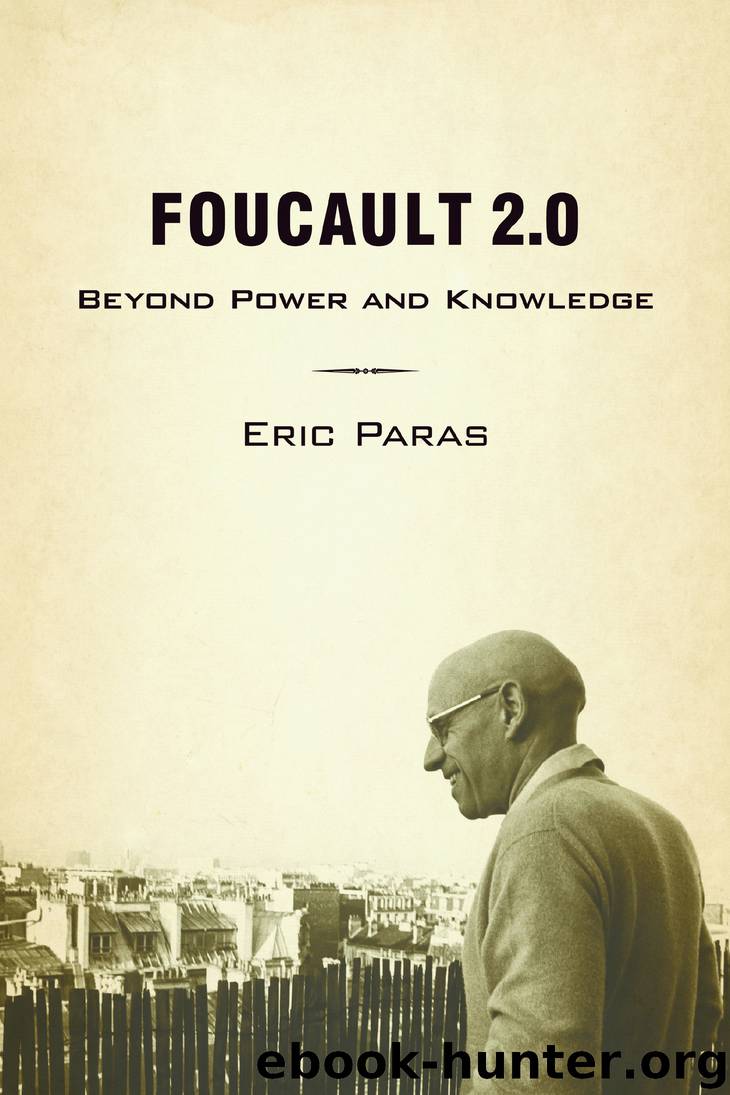Foucault 2.0 by Eric Paras

Author:Eric Paras [Paras, Eric]
Language: eng
Format: epub
Publisher: Other Press
Published: 2020-01-14T00:00:00+00:00
* * *
—
ARTS OF LIVING were, then, at the center of the investigations that Foucault aimed to conduct in the early 1980s. They would serve as the base material and guiding thread in his 1981 course at the Collège de France, entitled Subjectivity and Truth. This, in turn, doubled their importance, as Subjectivity and Truth provided essential raw material for both The Use of Pleasure and The Care of the Self. For it was the case, Foucault told his audience, that the link between subjectivity and “truth,” while not visible only in arts of living, was nevertheless on display there in a particularly vivid way. They constituted, as such, an especially rich and interesting body of documentation for the general problem posed by the course.23
If students of Foucault sensed a certain lack of detachment in the philosopher’s pursuit of the “arts of living” idea, they would not have been deceived. His comments beyond the auditorium walls—like those he made during a December 1981 interview with German film director Werner Schroeter—were striking: “The art of living is the art of killing psychology, of creating with oneself and with others unnamed individualities, beings, relations, qualities. If one can’t manage to do that in one’s life, that life is not worth living.”24 The Greeks, Foucault added, had understood that an existence could be a perfect and sublime work (oeuvre), “while we have completely forgotten it, especially since the Renaissance.”25 Uncharacteristic flashes of emotion like this one revealed that this was a matter in which the philosopher was personally invested. For the attention that Foucault paid to antique arts of living cannot be wholly understood within the context of his early-1980s research itinerary. Rather, it merged almost seamlessly into his contemporary social and personal concerns.
Chief among these concerns—however surprising it seemed—was the search for a modern morality. Foucault, it will be recalled, had argued in The Order of Things that modern thought was incapable of generating a coherent morality.26 He compounded this statement in a spring 1968 interview, stating pithily that, “morality has ceased to exist in the course of the twentieth century.”27 Yet by the end of the 1970s, Foucault began to show signs of wavering on this point (as on so many others). As early as 1977, the language of ethics began to infiltrate his working vocabulary. In his preface to the English edition of Deleuze and Guattari’s Anti-Oedipus, he called the book, “the first book of ethics to be written in France in quite a long time.” It was, he wrote, a kind of ethical treatise showing us how to unburden ourselves of the “fascism” that, against our will perhaps, inhabits our words and acts.28
More tantalizing, perhaps, was the precise wording that Foucault used. Anti-Oedipus, he wrote, was an “art of living counter to all forms of fascism.”29 Being anti-oedipal had become, for many, “a life style, a way of thinking and living.” These were atypical expressions for the philosopher. Was there a link between Foucault’s reconsideration of the idea
Download
This site does not store any files on its server. We only index and link to content provided by other sites. Please contact the content providers to delete copyright contents if any and email us, we'll remove relevant links or contents immediately.
Hit Refresh by Satya Nadella(9137)
When Breath Becomes Air by Paul Kalanithi(8447)
The Girl Without a Voice by Casey Watson(7889)
A Court of Wings and Ruin by Sarah J. Maas(7847)
Do No Harm Stories of Life, Death and Brain Surgery by Henry Marsh(6941)
Shoe Dog by Phil Knight(5269)
The Rules Do Not Apply by Ariel Levy(4969)
A Higher Loyalty: Truth, Lies, and Leadership by James Comey(4964)
Hunger by Roxane Gay(4928)
Tuesdays with Morrie by Mitch Albom(4784)
Everything Happens for a Reason by Kate Bowler(4743)
The Immortal Life of Henrietta Lacks by Rebecca Skloot(4588)
Millionaire: The Philanderer, Gambler, and Duelist Who Invented Modern Finance by Janet Gleeson(4478)
How to Change Your Mind by Michael Pollan(4357)
All Creatures Great and Small by James Herriot(4322)
The Money Culture by Michael Lewis(4207)
Man and His Symbols by Carl Gustav Jung(4137)
Elon Musk by Ashlee Vance(4128)
Tokyo Vice: An American Reporter on the Police Beat in Japan by Jake Adelstein(3996)
